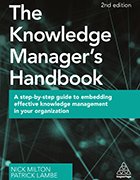4 important skills of a knowledge management leader
KM programs need a leader who can motivate employees to change their routines. This leader needs a long-term mindset and the ability to translate KM ideas into business language.
Knowledge management is a simple idea, but getting workers to participate is a different story.
Every knowledge management (KM) program needs a leader to oversee the team and its activities. The KM leader is responsible for planning, implementing, auditing, enhancing and maintaining an effective and efficient KM program within an organization. This person must understand the technical aspects of KM, but their ability to make personal connections and motivate others is most important, according to authors Nick Milton and Patrick Lambe in their book, The Knowledge Manager's Handbook: A Step-by-Step Guide to Embedding Effective Knowledge Management in Your Organization.
Throughout the book, Milton and Lambe draw on their own experiences as KM experts, along with real-life case studies, to offer readers a practical guide for KM implementation.
In Chapter 5, "The Role, Skills and Characteristics of the Knowledge Management Leader," Milton and Lambe outline important qualities organizations should look for in a KM leader. The chapter can also help existing KM leaders understand which skills they already have and which they need to further develop.
The main KM leader skills that Milton and Lambe highlight are the following:
- Is a proven change agent. A successful KM program often involves the participation of many workers across an organization. For instance, experienced contact center agents might give quarterly training presentations to new hires as part of their department's KM strategy. A change agent can foster this participation as they help workers understand the importance of KM practices.
- Understands the organization. Internal appointments usually make more effective KM leaders than external ones because they understand their organization's culture and politics. The leader should ideally be a respected senior member of the organization, according to Milton and Lambe. KM leaders can more easily inspire change if they already have the admiration of important people within the organization.
- Has a long-term strategy. KM teams cannot implement a program overnight. Typically, they need a few years to completely embed their framework into the organization's culture. The KM leader must find ways to address immediate pain points while still maintaining focus on long-term implementation goals.
- Can translate KM to business language. KM teams often have their own jargon, but this language can confuse workers in other departments. The KM leader must understand the organization's day-to-day business language and use it to communicate KM ideas across the company.
To learn more about the role of a KM leader, download this free chapter excerpt from The Knowledge Manager's Handbook: A Step-by-Step Guide to Embedding Effective Knowledge Management in Your Organization.
Editor's note: This excerpt from The Knowledge Manager's Handbook by Nick Milton and Patrick Lambe is © 2019 and reproduced with permission from Kogan Page Ltd.








